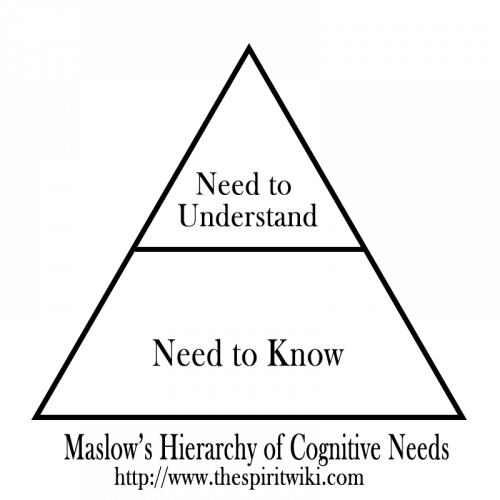Hierarchy of Cognitive Needs: Difference between revisions
An Avatar.Global Resource
No edit summary |
No edit summary |
||
| Line 10: | Line 10: | ||
* [[Need to Know]] and the | * [[Need to Know]] and the | ||
* [[Need to Understand]] | * [[Need to Understand]] | ||
No doubt Maslow based his statement of the existence and significance of cognitive needs on his clinical evidence, these needs are self evident in every small child. The need to know is on display in children at a very early age. As Maslow says, this is the "basic desire to know, to be aware of reality, to get the facts, to satisfy curiosity, or as Wertheimer phrases it, to see rather than to be blind." (Maslow, 1943, p. 385). On the need to understand, Maslow observed that "even after we know, we are impelled to know more and more minutely and microscopically on the one hand, and on the other, more and more extensively in the direction of a world philosophy, religion, etc." (Maslow, 1943, p. 385). In other words, it was never enough to just know something, we also had to understand. According to Maslow, "The facts that we acquire, if they are isolated or atomistic, inevitably get theorized about, and either analyzed or organized or both. This process has been phrased by some as the search for 'meaning.' We shall then postulate a desire to understand, to systematize, to organize, to analyze, to look for relations and meanings"(Maslow, 1943, p. 385). Maslow notes of the need to know and the need to understand, "we see that they too form themselves into a small hierarchy" (Maslow, 1943, p. 385). | No doubt Maslow based his statement of the existence and significance of cognitive needs on his clinical evidence, these needs are self evident in every small child. The need to know is on display in children at a very early age. As Maslow says, this is the "basic desire to know, to be aware of reality, to get the facts, to satisfy curiosity, or as Wertheimer phrases it, to see rather than to be blind." (Maslow, 1943, p. 385). On the need to understand, Maslow observed that "even after we know, we are impelled to know more and more minutely and microscopically on the one hand, and on the other, more and more extensively in the direction of a world philosophy, religion, etc." (Maslow, 1943, p. 385). In other words, it was never enough to just know something, we also had to understand. According to Maslow, "The facts that we acquire, if they are isolated or atomistic, inevitably get theorized about, and either analyzed or organized or both. This process has been phrased by some as the search for 'meaning.' We shall then postulate a desire to understand, to systematize, to organize, to analyze, to look for relations and meanings"(Maslow, 1943, p. 385). Maslow notes of the need to know and the need to understand, "we see that they too form themselves into a small hierarchy" (Maslow, 1943, p. 385). | ||
{{template:endstuff}} | {{template:endstuff}} | ||
[[category:terms]] | [[category:terms]] | ||
[[category:lightningpath]][[Is a term:: | [[category:lightningpath]][[Is a related term::Hierarchy of Needs| ]] | ||
Revision as of 15:03, 22 October 2019
Caution. This article/definition is in draft form and at this time may constitute no more than rough notes, reminders for required content, or absolutely nothing at all. Content is subject to revision.
The Hierarchy of Cognitive Needs includes the following two important biological needs.

- Need to Know and the
- Need to Understand
No doubt Maslow based his statement of the existence and significance of cognitive needs on his clinical evidence, these needs are self evident in every small child. The need to know is on display in children at a very early age. As Maslow says, this is the "basic desire to know, to be aware of reality, to get the facts, to satisfy curiosity, or as Wertheimer phrases it, to see rather than to be blind." (Maslow, 1943, p. 385). On the need to understand, Maslow observed that "even after we know, we are impelled to know more and more minutely and microscopically on the one hand, and on the other, more and more extensively in the direction of a world philosophy, religion, etc." (Maslow, 1943, p. 385). In other words, it was never enough to just know something, we also had to understand. According to Maslow, "The facts that we acquire, if they are isolated or atomistic, inevitably get theorized about, and either analyzed or organized or both. This process has been phrased by some as the search for 'meaning.' We shall then postulate a desire to understand, to systematize, to organize, to analyze, to look for relations and meanings"(Maslow, 1943, p. 385). Maslow notes of the need to know and the need to understand, "we see that they too form themselves into a small hierarchy" (Maslow, 1943, p. 385).
Citation and Legal
The SpiritWiki is a freely available, open-access Knowledge System devoted to health, healing, and reconnection. You may freely use information in the SpiritWiki; citation and attribution are welcomed, but not required. You can help this knowledge system grow by joining its Patreon.
The SpiritWiki is marked CC0 1.0 Universal and in the public domain, free for everyone on the planet to use. Please support its growth.
Footnotes
